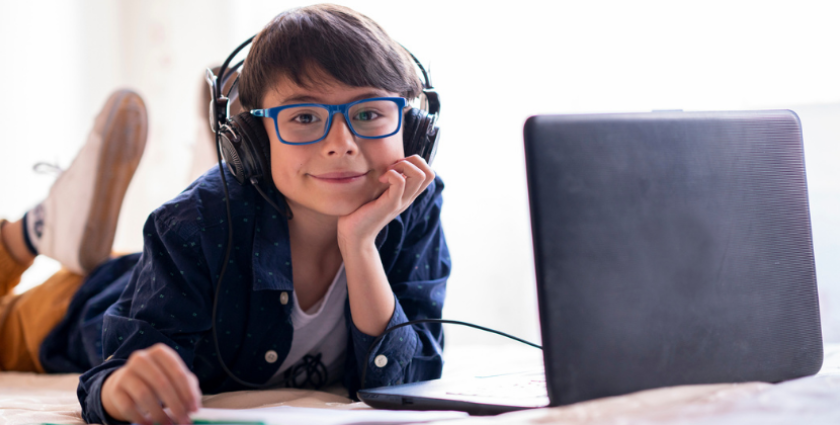
Screens are a major part of our day-to-day lives — for both kids and adults.
Between school, work, and entertainment, we spend hours every single day in front of screens. Modern day technology helps us stay connected to family and friends, even when life keeps us too busy to visit as often as we’d like.
However, we also know that too much blue light exposure can negatively impact our physical and mental health. Most notably, too much time spent in front of screens, especially too close to bedtime, can cause problems like eye strain and poor sleep.
Obviously, getting rid of screens altogether is not the answer.
So, how can we protect our kids and ourselves from the harmful effects of blue light exposure without giving up the technology that powers our lives?
Below, we’re sharing 6 ways to reduce the potentially harmful effects of blue light on our brains and bodies (hint: one of those ways involves trading screen time for audio entertainment platforms like Pinna!).
6 Strategies to Reduce the Potentially Harmful Effects of Blue Light on Our Brains and Bodies
1. Try out blue light glasses.
Blue light glasses are inexpensive to buy and simple to use. You can find them at almost any retail store or order them online. You can also have a blue light filter added to prescription glasses for a nominal fee. These glasses aren’t foolproof, but they do reduce the amount of blue light you and your kids are exposed to.
Bonus — kids will love that the frames come in fun colors and patterns!
2. Implement the 20/20/20 rule.
Have you heard of the 20/20/20 rule? It’s simple. For every 20 minutes you spend on screens, look away for 20 seconds at something that’s at least 20 feet away from you. Even better…look out a window. This gives your eyes a break and helps prevent the dreaded digital eye strain.
3. Adjust your screen settings.
One easy fix is to adjust the screen settings on your phone, tablet, or computer. Some newer TVs even have this option. Check the display settings on each of your devices and look for a “night light” option. On the computer, you can also find many free and paid browser extensions that offer this service. If you can filter out some of the blue light you and your kids are exposed to, at least later in the day, you’re setting everyone up for a better night’s sleep.
4. Spend some time outdoors.
Research shows that spending time outdoors can reduce a child’s likelihood of developing myopia (aka nearsightedness). Not to mention, time spent outdoors naturally lessens time in front of a screen. It’s estimated that kids spend 7.5 hours per day on screens between school and play.
Another benefit to spending time outside playing? Better sleep. Exposure to sunlight, fresh air, and movement all contribute to a quality night’s rest — for all of us.
5. Turn off screens before bed.
One of the simplest ways to avoid digital eye strain and improve your sleep quality is to turn off screens an hour or two before you go to bed. This goes for kids too. Replace nightly screentime with books, board games, or a walk around the block. Not only will your whole family experience better sleep, but you’ll also make memories that will last a lifetime.
6. Give audio a try.
Want to spend less time in front of screens? Try a different medium — maybe audio. Nowadays, you can listen to high-quality podcasts and audiobooks on pretty much any topic in the world. Pinna is an incredible resource with a huge library of podcasts, audiobooks, and music for kids (and entertaining enough for parents to enjoy too!).
The Wrap-Up
It’s easy to lose track of how much time we all spend in front of screens. Yet, the negative impact of too much screen time is evident when we experience digital eye strain and poor sleep.
The tips shared above will help you and your family find balance in making the most of the technology we have at our fingertips while being mindful of too much blue light exposure.
We’re all ears!
What’s your favorite Pinna podcast? We’d love to hear from you! Find us on all our social platforms – Facebook, Instagram, Twitter, and Pinterest – or email us at contact@pinna.fm.

 Amy Thetford
Amy Thetford